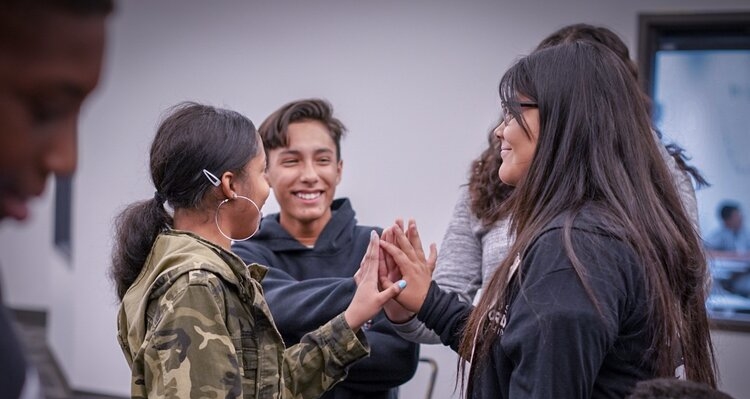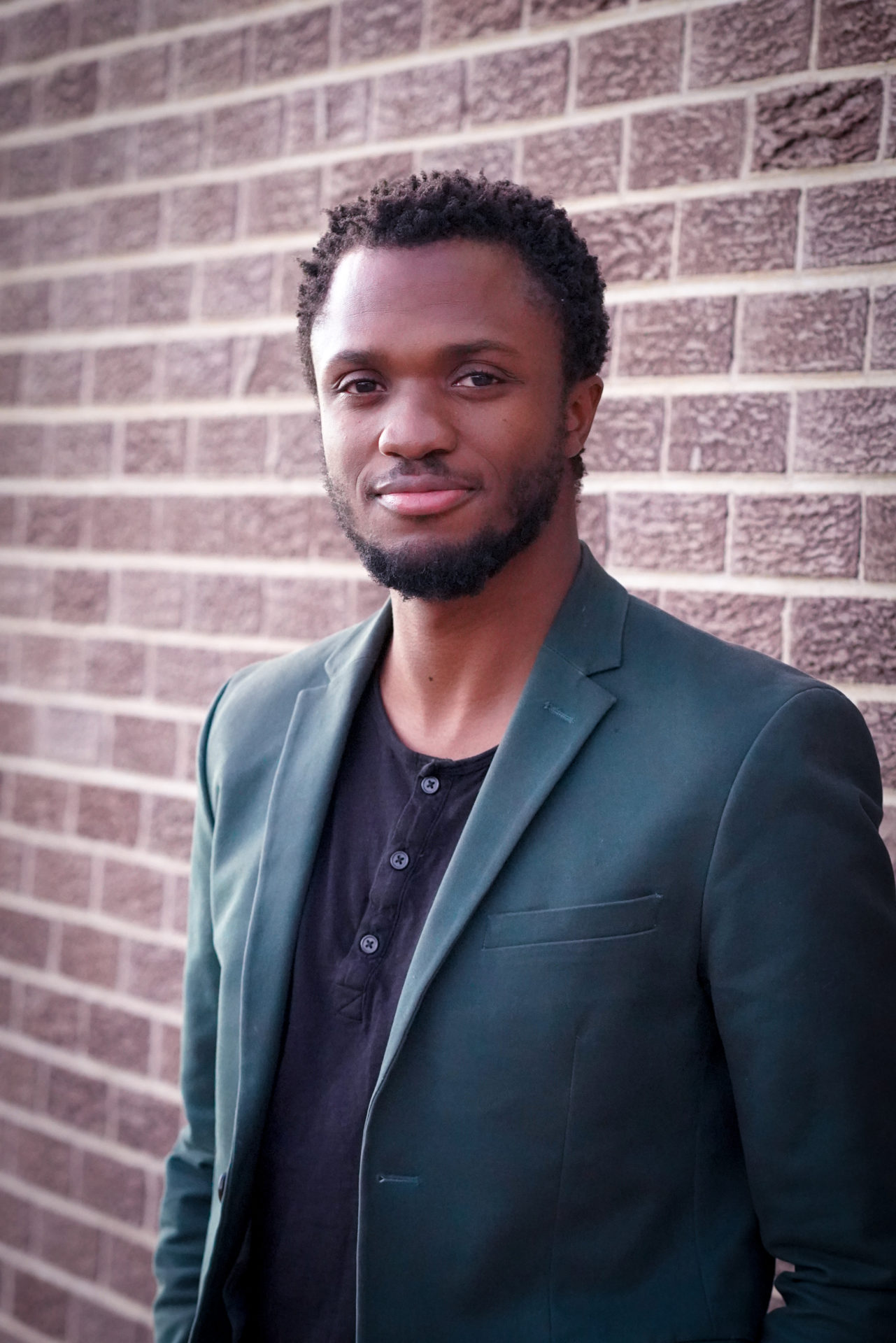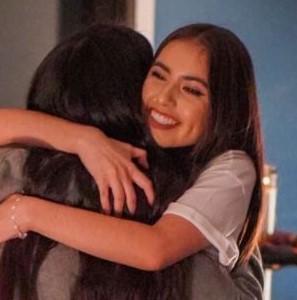Everyone feels like there’s a common purpose that brings us together, which is what it means to be a community. Each day, we’re able to bring our best selves.
Wisdom Amouzou, Co-Founder and Executive Director, Empower Community High School
We sat down with members of Empower Community High School, including Wisdom Amouzou (Co-Founder and Executive Director), Ariana Villalovos (Educator), and Tesfana Gebremariam (Young Learner) to discuss their learning community’s origins, focus on building a culture of love and support, and shift to virtual learning during the 2020 COVID-19 pandemic.
Q. Where did the idea for Empower Community High School originate?
Ariana: In 2017, during my freshman year in college, I took a course with Empower Co-founder, Olivia Jones. That year, I was interested in finding opportunities that would positively transform my community.
Olivia took note of my activism and leadership and introduced me to Wisdom. The three of us eventually sat down together at a coffee shop to discuss building a school where students drive their own learning. We noticed a lot of flaws in the conventional school system, so we wanted to create something we believed every young person deserves to have access to in their communities. We didn’t really consider that to be a radical idea.
Creating Empower is one of my biggest accomplishments. To be able to bring this idea to life at such a young age is an amazing feeling. And, joining this community as a freshman English teacher after graduating from college this summer was a great “coming-full-circle” moment.
Q. How did your childhood experiences shape Empower’s design?
Wisdom: Growing up in Togo, West Africa, my parents had extremely high expectations for me and my siblings. I got to experience what happens when people that love you push you to reach your full potential and how that support can unleash a child’s greatness.
And, there were tangible results. Because of that support, my brothers and I each skipped two grades by the age of 10 and always felt equipped to take charge of our own learning.
That was part of the dream for Empower. Since opening, we’ve taken our students and parents to visit other innovative spaces around the country, where we’ve been able to find our tribe—people with which we feel kinship. Empower is part of a larger collective tribe of dope schools where young people are at the center. We are part of a movement of schools that are building the capacity to unleash geniuses.
Ariana: I realized very early that my education was not grounded in the pedagogy of love. It often felt forced and was definitely not a space where I could truly apply anything that I learned in the real world.
Even as the valedictorian of my high school, I didn’t feel complete. I was not given enough resources to reach my full potential, especially when compared to other students in my district or state. And, if I felt this way as the valedictorian, how were my peers feeling? Many of them dropped out or didn’t continue their education beyond high school because they didn’t put much value in school. During the 12 years they spent in school, they were never empowered to find something they loved or to learn more about themselves.
If you’re able to build a place where students feel cared for and empowered, they can change their mindset. It’s like a domino effect. I believe that you have to love students immensely for them to actually want to change. That’s what Empower High School embodies and puts into practice, every day.
Q. How would you describe the culture at Empower?
Tesfana: My experience at Empower is much better because I feel my voice is heard and respected. At my previous schools, I felt like they had a path written for me that I had to follow. That really limited my education, voice, and power. Now, I feel like my future is being put into my hands.
At Empower, I feel like they actually care about what we’re learning and the allow us to own that learning. For example, this year, I realized that Zoom burnout was a real thing that affects your mental health. I, alongside others on the student leadership team, brought this forward to the administration to discuss how we could fix it.
One solution we agreed on was a Zoom break. For a whole week, we didn’t have any classes on Zoom, and the student leadership team worked together with teachers to come up with creative assignments that challenged students but didn’t overwhelm us.
In that moment, I really saw how much they love us. When someone doesn’t love you, they won’t respond to your suffering. The administration and teachers actually dedicated time to helping us identify a solution to a problem we all noticed was affecting our well-being.
Ariana: During the recent Presidential election, we were all on edge. I was honest with my students, expressing, “I’m not in the right space mentally to teach right now.” Once I opened up, they admitted they were feeling the same way. And, we decided together not to have class.
Instead, we had a discussion about everyone’s mental state. How are you feeling? Do you need any support? What can I do to help you? We were unsure of what was going to happen in the streets. It was scary.
Teaching the academic material that week was less important than our safety and well-being. I told my students how much I cared about them and provided my contact information in case they needed anything. It was important to create a safe space because I never want to force students to learn when they’re not in the right place mentally.
Wisdom: One of the permanent innovations that we’re implementing from this year is the Justice Fund—families who need anything can get support, whether that’s gift cards, getting access to WiFi, rental assistance, or mental health support.
When one family is impacted by a crisis, our whole community, including other families, is impacted. We know a crisis at home can affect how a child shows up, which affects their friends, classmates, and teachers. What warms my heart and gives me hope is seeing people step up to ensure others aren’t suffering, especially during this pandemic.
This is showing up in a lot of different ways.
In response to the need to address our kids’ health and isolation from friends, we have a group of parents who are organizing themselves to provide social interaction opportunities (either virtually or in-person at a socially distant event) at least once a month. It’s beautiful. We all need to take care of each other right now.
Our education systems and learning communities aren’t always built to offer that type of support. For us, it’s about honoring our tribe.
Q. What makes you feel like you belong to a community? How have you maintained that during the pandemic?
Tesfana: I feel like I belong when I know people care about me. Throughout the pandemic, when a teacher or student has recognized that someone in our community is struggling, whether it be with their mental health or completing an assignment, they take the initiative to reach out. We also regularly reach out to others to remind them that someone is always here to help. It’s especially helpful for everyone to be empowered to take on that role because students don’t always feel comfortable opening up to teachers and staff.
Wisdom: The word that keeps coming to my mind is ”love”—love, love, love. Empower is a place where people feel safe and know they belong. Everyone feels like there’s a common purpose that brings us together, which is what it means to be a community. Each day, we’re able to bring our best selves.
During this pandemic, it’s been challenging to offer the same experience, though we remain focused on increasing our students’ access to enrichment opportunities. The best relationships are formed in our enrichment courses, where we’re able to have deep discussions and strengthen what we’ve built together. That is when we all feel most empowered.
Ariana: Most teachers in the nation would say that this academic year has been very challenging. As everything has moved online, it’s been really disheartening to see the disparities between the families who have access to resources and families who don’t.
To improve the experience for everyone, I’ve moved students into cohorts. This allows them to hold each other accountable, including when someone loses focus or the conversations go astray, in a very loving way. They’re also able to manage their own learning, as a team.
Introducing this concept of students managing their own learning during their freshman year is important because the education system often holds kids’ hands throughout the entire learning process, which doesn’t give them any freedom or ownership.
I’ve witnessed this transform my freshmen in a very positive way, especially students who were very shy at the beginning of the year. Many of them are now the ones speaking up to keep everyone on track when people get distracted. That’s a huge shift. They are really showing that we can be beautiful human beings to each other, while still demonstrating tough love—that’s amazing.
Q. How does the strong sense of community you’ve established at Empower help you to collectively (and individually) grapple with current events that hit close to home?
Wisdom: The murder of George Floyd hit me especially hard as a Black man in this country and as a Black man trying to lead a community during this time.
I created a video reflection that spoke to our transformative resistance framework, during which I shared how I was experiencing and analyzing the moment. I spoke to the strategies that different groups were using, including protestors, the cops, and the government. It was a moment of vulnerability that I hoped would help our community cope with their own emotions.
I was struggling with finding any hope at that point, especially when I couldn’t be with my students. They’re the main source of my hope and inspiration. If this all wasn’t happening during a pandemic, students would be using the writing center as a social justice community hub. They would likely plan events, write dope pieces, and establish a place of healing for everyone.
Ariana: This summer, I collaborated with the 10th-grade English teacher to brainstorm how we could design our curriculum to investigate the tension arising around racial justice issues.
We decided our response needed to connect to the real world, specifically the murder of George Floyd. This approach tied to one of the central questions from our spring academic quarter: How does living without borders impact power and freedom? It was about addressing what’s going on in the world.
Our inquiry included questions, such as: What role does storytelling play in the development, narration, and reclamation of identity? And, how does your current identity intersect with what’s happening right now in the world?
These questions don’t often emerge in English because our main focus has been studying literature. But, we used these questions to rethink how we engage the space provided by our curriculum.
There are ways young people can start to inspire change, right now, though writing and public speaking. This year, students are doing a TED Talk as their summative assessment. They are asked to identify a real societal problem and propose a solution. It’s about empowering young people to use their voice to be agents of positive change.
Tesfana: In our leadership class, my project group started Black Girl Empowerment (BGE). We created BGE to confront the reality that Black girls are often diminished in society. We wanted to show that Black is beautiful, and we are capable of greatness.
That was a big step for me because in the past, I would have never had the opportunity or confidence to take on a leadership role like that. Now, when I see other issues in society that need to be addressed, I feel empowered to speak up and act.



